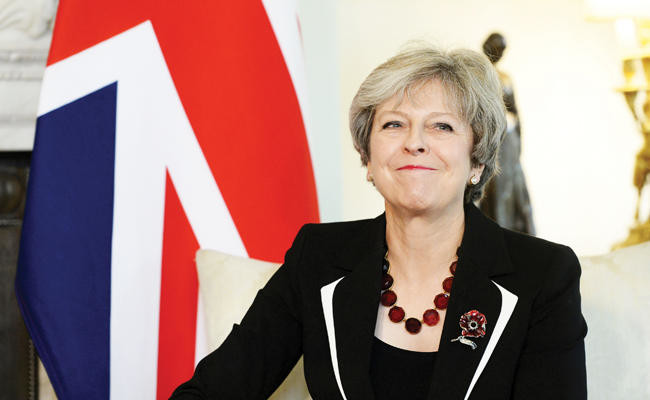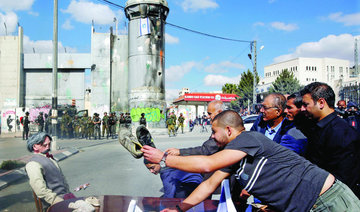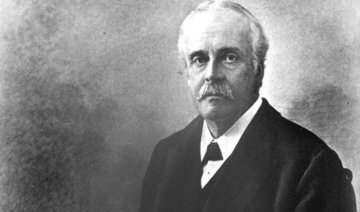LONDON: Prime Minister Theresa May told Benjamin Netanyahu on Thursday that Israel must end illegal settlements to achieve peace, as they celebrated the centenary of the British statement that helped lead to the Jewish state’s creation.
The two leaders attended a dinner celebrating the Balfour Declaration of 1917, a statement offering Britain’s support for “the establishment in Palestine of a national home for the Jewish people.”
In a speech at the event, May said Britain was committed to a two-state solution with a viable Palestinian state.
“There will need to be compromises from each side if we are to have a realistic chance of achieving this goal — including an end to the building of new settlements and an end to Palestinian incitement too,” she said.
The prime minister held talks in Downing Street earlier in the day with Prime Minister Netanyahu, who said: “Israel is committed to peace, I’m committed to peace.
“A hundred years after Balfour, the Palestinians should finally accept a Jewish national home and finally accept a Jewish state. And when they do, the road to peace will be infinitely closer. In my opinion peace will be achievable.”
The Balfour Declaration is seen as a precursor to Israel’s creation in 1948, and the anniversary is a joyous occasion for Israelis.
But many Palestinians say it led to hundreds of thousands fleeing or being forced from their homes, and thousands took to the streets of various cities on Thursday in protest.
Effigies of May and Balfour were set ablaze in the West Bank city of Nablus, while in Hebron protesters burned a British flag.
Palestinian President Mahmoud Abbas wrote in a newspaper opinion piece that “the creation of a homeland for one people resulted in the dispossession and continuing persecution of another.”
May said she would “absolutely not” apologize for the Balfour Declaration, telling dinner guests: “We are proud of our pioneering role in the creation of the state of Israel.”
But she also cautioned that one of the key caveats of the historic letter — that the rights of non-Jewish communities shall be protected — has not been realized.
“Sadly, Balfour remains unfinished business — as his fundamental vision of peaceful co-existence has not yet been fulfilled,” she said.
Netanyahu, who is on a five-day visit to London, also met British Foreign Secretary Boris Johnson. Their discussions were expected to include US President Donald Trump’s decision last month to refuse to certify the 2015 Iran nuclear agreement.
Before their meeting, May emphasised Britain’s commitment to the deal, while Netanyahu said: “The goal that I have in mind is not keeping or eliminating the deal, it is improving the deal and correcting its main flaws.
“Those that want to keep the deal should co-operate on correcting the deal.”
Dignitaries at the dinner included a descendant of the Balfour Declaration’s author, then foreign secretary Lord Arthur Balfour.
In her speech, May was also warned against a “pernicious form of anti-Semitism which uses criticism of the actions of the Israeli government as a despicable justification for questioning the very right of Israel to exist.”
Jeremy Corbyn, leader of the opposition Labour party, was unable to attend but sent a colleague in his place.
On Friday, Netanyahu said he hoped a US peace initiative would work and praised President Donald Trump for taking a fresh approach to bringing the Israelis and Palestinians back to negotiations.
Asked during a visit to London to commemorate the 1917 British declaration of support for a Jewish homeland if he felt now was the moment for peace in the region, noting Trump’s involvement in peace efforts, he said: “Hope so.”
“What’s being discussed now is an American initiative. Obviously we make our interests and our concerns known to Mr. Trump. He’s coming with a sort of refreshing ‘can-do’ thing... they’re trying to think out of the box,” Netanyahu said at London’s Chatham House think tank.
Netanyahu has previously expressed doubts about the Trump initiative, telling France’s President Emmanuel Macron in July that it would be difficult to move forward quickly because he felt Palestinian President Mahmoud Abbas may not be able to deliver on commitments he had made.
But he said that more countries in the region were now beginning to engage constructively with Israel.
“The reason I draw hope from the moment is because of the larger shift in Arab-Israeli relations with the countries of the region. I cannot emphasize how dramatic that is,” he said.
Israel must end illegal settlements, says May
Israel must end illegal settlements, says May

Jordan-EU Summit confirms commitment to regional security, investment

- Jordan, EU to hold investment conference in April to enhance economic partnerships
- Ursula von der Leyen says King Abdullah is key partner for Europe in Middle East, relations between parties ‘built on stability, on security, but also on prosperity’
LONDON: King Abdullah II of Jordan hosted the first Jordan-EU Summit in Amman on Thursday, with European Council President Antonio Costa and European Commission President Ursula von der Leyen in attendance.
King Abdullah noted that the summit had built on last year’s Strategic and Comprehensive Partnership agreement with the EU, enhancing political dialogue and economic cooperation, according to the Jordan News Agency.
He spoke of his appreciation of the EU’s support for Jordan’s modernization and highlighted the country’s readiness to enhance cooperation in security, defense, education, and youth empowerment.
“Our partnership is also vital in supporting sustainable growth, job creation, and innovation, by strengthening economic resilience and expanding cooperation in trade and investment,” King Abdullah added.
Crown Prince Hussein attended the expanded meeting with EU leaders at Al-Husseiniya Palace.
Jordan and the EU are to hold an investment conference in April to enhance economic partnerships between the two parties, while the first EU-Jordan Security and Defense Dialogue is also scheduled for this year in Amman.
Costa said that bilateral relations with Jordan were strong and would continue to strengthen. He praised Jordan’s initiatives to address the humanitarian crisis in Gaza by establishing air and land corridors; its contribution to regional stability; its efforts to de-escalate tensions; and its pursuit of peace.
Von der Leyen said that King Abdullah was a key partner for Europe in the Middle East, and that relations between the EU and Jordan were “built on stability, on security, but also on prosperity.”
She added: “In times of growing geopolitical challenges, it is good to know that the European Union and Jordan stand side by side, because this is what friends do."
She noted that the EU aimed to increase investments in Jordan to 1.4 billion euros.
The summit also covered regional and international developments, including Lebanon, the Syrian Arab Republic, Ukraine, the reform of the Palestinian Authority, and Israeli settlement policy in the West Bank.
Jordan’s Prime Minister Jaafar Hassan, Deputy Prime Minister and Foreign Minister Ayman Safadi, Director of the Office of His Majesty Alaa Batayneh, Minister of Planning and International Cooperation Zeina Toukan, Jordan’s Ambassador to Belgium Yousef Bataineh, and a number of European officials also attended the summit.














